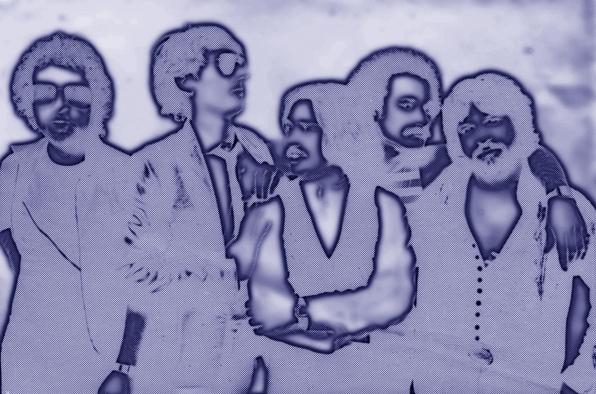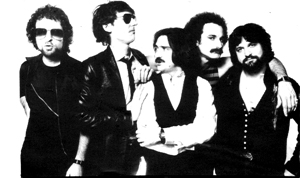
|
Search JoyZine with Google Site Search! |
Blue Öyster Cult Interview by Melissa Bennett
Blue Öyster Cult comprises five members: Eric Bloom (guitar/vocals), Rick Downey (the only member of the band not in the original lineup, on drums), Allen Lanier (keyboards) and Donald "Buck Dharma" Roeser (guitar, keyboards and vocals). In the late '70s, B.O.C. started out as Soft White Underbelly, later becoming the Stalk Forest Group, and shortly afterward adopting the name we know them by today. In 1972 B.O.C. released their debut album, the eponymous Blue Öyster Cult. 1973 brought us Tyranny and Mutilation, and in 1974 they released Secret Treaties. Shortly afterward, B.O.C. moved on to headlining concerts in arenas around the U.S. 1975 yielded On Your Feet or on Your Knees, a double-live set featuring "Born to Be Wild." 1976 gave us "Agents of Fortune," a Top Forty hit. "(Don't Fear) The Reaper" helped On Your Feet or on Your Knees go gold. "This Summer Ain't for Love" was released as a single, and B.O.C. breaks out a $100,000 laser light show. Spectres is released in 1977, featuring the hit song "Godzilla" and a song that Eric co-wrote with Ian Hunter (Mott the Hoople, Hunter/Ronson) entitled "Goin' Through the Motions." In 1978 they released "Some Enchanted Evening," a version of The Animals' "We Gotta Get Out of This Place," followed in 1979 by Mirrors. In 1980 the Cultosauros Erectus LP led to the acclaimed Black and Blue tour and later the movie, which was filmed at Nassau Coliseum on Long Island. The Black and Blue tour was later proclaimed "The Tour of the Year" by Performance magazine. And now it's time to talk. Q: I've been trying to come up with questions you haven't already been asked every time you've been interviewed...
ERIC: Well, my favorite question these days is, "Guys, you've just had your 12th album, what is it that keeps the band together?" (laughter) Believe it or not, I still get asked that at least twice a week. Oh, and there's "Where did the name of the band begin?" Are you ready? Don't you want to ask me? Q: Oh, all right: Where'd you get the name? ERIC: (laughs) Q: I'd just like to know, why the switch from Soft White Underbelly to Blue Öyster Cult? ERIC: Soft White Underbelly was the original name of the band 14 years ago. Why the change? Well, because Soft White Underbelly had a recording contract with Elektra Records from 1967 to 1969 or so, and recorded two albums, neither of which was ever released. To make a very long story short, we were thrown off Elektra for a variety of reasons, so when we were trying to get another recording contract about a year and a half later, we couldn't use the name anymore due to the problem with Elektra. And we didn't want to get a new contract under a name that we had already failed under, so we changed the name; hence, Blue Öyster Cult. The new name came from a lyric from a song called "Sub-Human." That song was originally called "Blue Öyster Cult," so we listed the title as our name. Q: What would you like to talk about? The ball is in your court. ERIC: OK, let's talk about Kupiac. What do you think? RICK: Sure. ERIC: He was the third string quarterback for Denver—good guy. Anyway, one day he came home from church and found his wife sitting on the bed shaking like a leaf. He says, "What's the matter?" She says, "I just got a call from the coach..." RICK. Reeves... Your story. ERIC: Anyway, she says, "You're going to play quarterback." RICK: Sort of like when Albert got kicked out of the band. ERIC: That's just what I was getting to. RICK: What a lead-in, huh? ERIC: Yeah, we were playing this gig in the U.K... RICK: West Grutten... ERIC: And our drummer didn't make it to the gig, so Rick was taken out of the lighting designer's role: "Rick, play." Albert arrived halfway through the show. RICK: "I was sleeping." ERIC: And about two days later he did the same thing. Q: Rick, how long have you been playing with the band? RICK: Oh, it was two years this past August. Q: But you started off as crew.
RICK: Roadying. I was Albert's drum roady for a couple of years and then our old road manager, who was a manager of mine when I was in a band, left, and I became road manager. Then I got into light design. So, basically, I started at the bottom. Well, that's probably why it went so smoothly. After you've done lights for about five years, if you don't know the songs by then... I also had been playing drums for about 14-16 years; that's what I always wanted to do. But it was never the case that I was waiting for Albert to break a leg. I mean, I wouldn't. ERIC. Albert drove himself out of the band. RICK: Yeah, there was no pressure. ERIC: Well, he's doing a solo album so I guess he's pretty happy. RICK: The weirdest thing was that he was an original member. He was one of the original members, and you don't usually self-destruct like that. I think he realized it too—but too late. I don't think he ever thought that he was going to be kicked out of the band by the rest of the members. The first gig that we did was at a place called Castle Donnington, near Nottingham, where Robin Hood hung out. It was 70,000 people and we just said, "What the hell!" ERIC: So we fired Albert, and that was Rick's first real gig. RICK: And the worst thing about it was, it was an AC/DC show, and they just shit on us totally; they wouldn't let us use any of our effects. See, they had opened for us a couple years prior, in '78, when they weren't even big yet. And they expected us to give them everything as far as lighting and sound [were concerned]. We were playing a theater in Pittsburgh—Stanley Theater—and they insisted on getting all of our lights, and you just don't do that. I think they were the first act on a three-act bill, and usually you give the first act some lights, the second act a lot more lights and, of course, your whole system for yourself. And they never forgot it. So when the tables were finally turned and we were opening for them, they just put it to us. As it was, that day we had a lot of problems going on—we had gear problems and it was just one problem on top of the other. We played OK, you know, we played fairly well. The next show was an outdoor German show and it was a thousand times better than that one [with AC/DC]. ERIC: As we speak, we are planning on changing the set. RICK: At the beginning of a tour, you're kind of torn between all these... ERIC: You don't really know what works, and the set is changing every other night. We have five new songs in our show—that's a lot of new songs. We talk a bit about the hassles with security in the big arenas. ERIC: I was kept from one of my own shows. I was trying to get into our gig in New Haven and I couldn't get in. I had my card and was banging on the door and nobody answers, so I found this security guard and he said, "I'll see what I can do," and he wound up doing nothing. So I said, "Hey, listen, I've got to hit the stage in about 15 minutes." And he said, "I don't care. I don't even like Blue Öyster Cult." Q: I guess I should ask you a few basic questions, although I know how you hate them. I'd like to know where you're going and what your plans are for the future. RICK: As far as this tour or where we're going musically? Q: Either, or both, really. ERIC: I don't know, those are pretty heavy questions. Well, this is the beginning of a world tour... Q: What's it like when you're setting out on something like that? ERIC: You get tired before you even start. RICK: I'm different from the rest of the guys because I'm single and I don't have a heavy home scene. So, there's always, like, a different feeling amongst us because I can understand the fact that if I had a wife and kids I wouldn't want to leave. But as it is now, I look forward to the touring. It's just that this got off to a bad start—not a wrong foot, but it got off slowly. We were supposed to have a whole new set and video projection and some of the pyro stuff that we used on the drums. Slowly, it's coming around. ERIC: Probably about two weeks from now we'll have all of the stuff that we were supposed to have two weeks ago. RICK: Yeah, normally after about the first month things just start to click. ERIC: A lot of the stuff that we brought out just doesn't work. The sound engineer is supposed to be using a very expensive digital delay, and it just doesn't work. And the fog machine... RICK: Second one in two weeks. ERIC: Anyway, the smoke machines haven't worked at all. Little things. You feel that the kids don't know, but still, it bums us out when, you know, "Where's the smoke, where the hell's the smoke?" Q: Why the decision to go back into the smaller clubs as Soft White Underbelly? RICK: It's just fun. But we're out 'til May, officially, and we'll probably be out through the summer but not touring as hard as now. We'll probably be doing weekends and outdoor shows. ERIC: The record should be Top Ten by May, so... Q: How many of you actually write? ERIC: We all write and we do a lot of collaboration with people outside the band. RICK: Actually, after this I'd really like to go back and work on the 13th album. We probably should start looking for a time frame, but... ERIC: It's a little difficult now because we don't know how far this record is going to go. Our record just came on the charts a week ago, so we've got 142 numbers to go if we're going to make the Top Ten, and that'll take at least 14 weeks. Our new video will be premiering this Wednesday on MTV, and the only other video we have on MTV is "Burnin' for You." But we have a few others that U.S.A. plays. Q: Since KOME has changed their format to heavy metal, do you think that they will be playing your new album? RICK: We wouldn't be considered heavy metal. There are a lot of people who don't consider us a heavy metal band, but then again there's are a lot of people who do, so it's hard to say. Q: So what do you consider yourselves? ERIC: I think we do heavy metal songs, but we're not a heavy metal group. RICK: I think we're a hard rock band. ERIC: It's an old term but I think it's appropriate. RICK: Metal bands, now... When I think of metal now, I think of Motley, Mot�rhead, Girlschool, Def Leppard... ERIC: Judas Priest, Iron Maiden... RICK: Scorpions, they're all in there. ERIC: Metal is back in vogue. RICK: Our show tends to be heavy metal... ERIC: Live, definitely. RICK: But our records aren't. ERIC: Look at "Burnin' for You," that's not a metal song. "Godzilla" is, and I'd say that "Take Me Away" is. RICK: The older stuff definitely is more metal. But also, we've been putting out albums for ten or twelve years. We've gone through about four changes. You have to change. |


